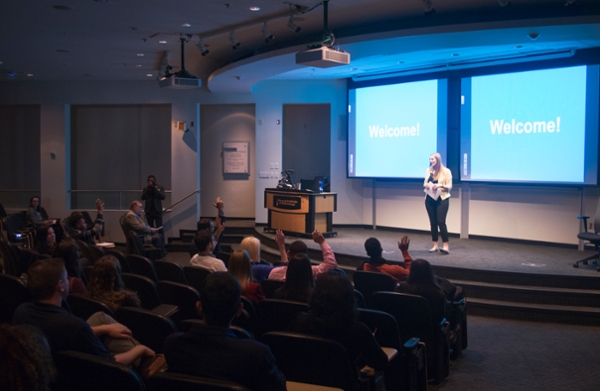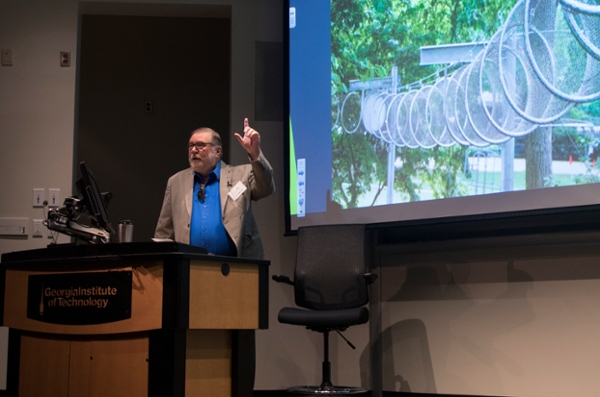On March 4th, 2017, the Scheller College of Business hosted Net Impact Local, a one-day conference organized by the Georgia Tech MBA Chapter of the national organization. Net Impact members care about turning passion into action in the area of environmental and social sustainability. They define sustainability as being able “to meet the needs of the present without compromising the ability of future generations to meet their own needs.” Fifteen presenters and nearly 80 students, faculty, and staff from seven colleges and universities attended.
Elizabeth Schultz, a 2017 Scheller MBA Candidate and the 2016-17 president of Georgia Tech’s Net Impact chapter, gave the opening remarks. She welcomed participants and credited the club with making her feel she “wasn’t being silly for having lofty goals about changing the world.”

In the keynote address, Dr. Terry Maple, Director Emeritus at Zoo Atlanta and Professor Emeritus at Georgia Tech, shared his personal history of putting ideas into action in the field of animal welfare. When he was hired to direct the city’s zoo in the 1970s, the institution was, he said, “the most maligned zoo in the country.” The zoo was constantly getting beat up in the media. Mayor Andrew Young reached out to Maple and pleaded for him to “stop the bleeding.”
Maple did much more than clean up the zoo’s image. He transformed the space from a place where animals could merely survive into one where they could thrive. Robert Sommer, in his book, Tight Spaces (1974), had coined the term “hard architecture” to describe mental hospitals, prisons, airports, and zoos. “In zoos,” Maple said, “animals lived in steel and concrete barriers in deplorable conditions.” Nature, on the other hand, is “soft”—freer and better. He realized the zoo could do better if it followed the guidelines of nature. He said, “We began to see how these soft environments affected behavior.” Maple reminded the audience of the importance of having big dreams. “The zoo turned around,” he said, “because of the young people who wanted to change the world.”
The panel, “Making Sustainability Sustainable,” tackled a more sobering truth: that resistance may be encountered when sustainable choices are neither easy nor profitable. Panelists discussed how businesses make strategic decisions to overcome challenges around sustainability.
Lindsay Wilkinson, Manager of Environmental Sustainability at InterContinental Hotels Group (IHG), said that many of IHG’s corporate clients and shareholders now must report their carbon footprint for their own sustainability officers. She said, “More companies are wondering: What’s the hotel’s waste diversion rate and carbon footprint from x number of travelers?” Wilkinson’s department recommends solutions to make hotels more sustainable. “Hotels must now tell us their consumption, and we can do calculations for them,” she said. The sustainable changes can both save hotels money and help generate revenue. She said, “Being clear about business benefits has been important for our success.”
Joey Womack, Founder and CEO of Amplify 4 Good, admitted that he learned the hard way that social impact is not always the primary goal among colleagues—including those who work in sustainability. “Someone could be looking at the position from a career perspective,” he said. “You have to find out the key performance indicator you both care about and work together to drive toward that common denominator.” Michelle Wiseman, Director of Waste Diversion & Outreach at City of Atlanta Mayor’s Office of Sustainability, agreed with Womack. “Partnership is the new leadership,” she said.
In the career talk, Scott Sadler, President & Chief Investment Officer at Boardwalk Capital Management, reminded the audience how much has changed in sustainable business in the last three decades. He said, “In 1987, when I took an entrepreneurship class in college, there was no mention of social impact.” When he was laid off from Goldman Sachs, his wife told him, “Let’s do something we’d be proud of.” This invitation became a turning point in his life towards a new definition of success.
Being open to modifying goals also appeared as a theme in a story told by Nikishka Iyengar, Sustainability Product Manager at Rubicon Global and Founder of The Guild. She said that as an undergraduate, she was passionate about eradicating poverty in developing countries. She spent time in Bangladesh micro-financing loans to help women start small businesses that could help pull their families out of poverty. One day, a farmer and husband of one of the microloan recipients, snidely asked, “Everything you’re doing with the loans is great, but what are you going to do about the floods?” In that area in Bangladesh, which was susceptible to climate change, one flood could bring the village back to square one. Iyengar asked herself, “How can I make a more sustainable and lasting impact? What if I could work with businesses to be a force for good in addressing these environmental and social problems that have been externalized and left for nonprofits to solve?” Since then, she continues to ask herself: “What do I see as the biggest problem? Where can I make the biggest impact?”
Other panels addressed: the emerging area of mission-driven business, urban farming and aquaponics, the circular economy, and how nature’s strategies can be applied to innovative leadership. The conference included a networking session during which attendees conversed with presenters and connected with like-minded peers. Second-year MBA student Amanda Palaski said that the conference got her excited at “a geeked-out level.” She credited Maple’s talk as being particularly inspiring since she aspires to be CEO of Zoo Atlanta. She said, “When I walk into the boardroom and ask, ‘What about the animals?’ I’ll know that the sort of conversation that I want to have is exactly what people before me have done successfully. It makes me feel really empowered.”
* Conference advisors: Dr. Terry Blum, Prof. Michael Oxman, and Arianna Robinson.
